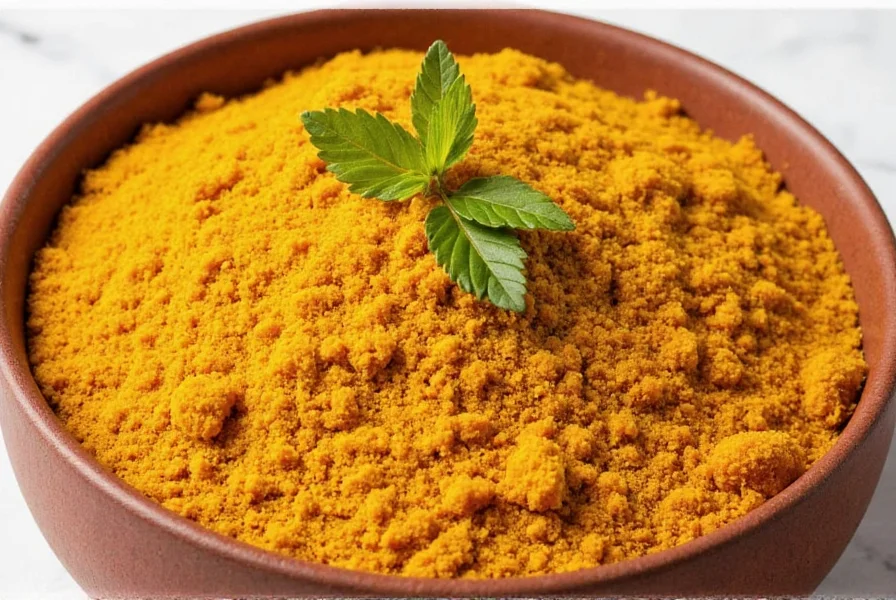Curry spice, a blend of spices like turmeric, cumin, and coriander, offers numerous science-backed health benefits. Research shows it can reduce inflammation, support brain health, and improve digestion. This article details the top evidence-based benefits and how to maximize them in your diet.
Top 7 Science-Backed Health Benefits of Curry Spice
Curry spice's health effects primarily come from turmeric (curcumin), ginger, cumin, and other components. Here's what research reveals:
1. Powerful Anti-Inflammatory Effects
Curcumin, the active compound in turmeric, is a potent anti-inflammatory agent. A 2016 study in the Journal of Alternative and Complementary Medicine found curcumin reduced pain and improved mobility in osteoarthritis patients as effectively as NSAIDs but without side effects. Multiple studies confirm it inhibits key inflammation pathways linked to chronic diseases.
2. Brain Health Support
Curcumin boosts brain-derived neurotrophic factor (BDNF), a growth hormone essential for brain function. Research in the American Journal of Geriatric Psychiatry (2018) showed curcumin supplementation improved memory and attention in older adults with mild cognitive impairment. It may also help clear amyloid plaques associated with Alzheimer's disease.
3. Digestive Aid
Cumin and ginger in curry spice stimulate digestive enzymes and bile production. A 2020 study in the Journal of Gastroenterology and Hepatology demonstrated that ginger significantly reduced symptoms of functional dyspepsia, including bloating and nausea. Cumin also helps regulate gut motility and reduce gas.
4. Antioxidant Protection
Curry spice blends contain high levels of antioxidants that neutralize free radicals. A 2019 review in Antioxidants journal found turmeric's curcuminoids had higher antioxidant activity than vitamin C or E. This protects cells from oxidative damage linked to aging and chronic diseases.
5. Heart Health Support
Studies show regular consumption of curry spice lowers LDL cholesterol and improves blood vessel function. A 2017 study in the Journal of Nutrition found participants who consumed curcumin daily had 12% lower LDL cholesterol and improved endothelial function compared to controls.
6. Natural Detoxification
Turmeric and cumin support liver detoxification pathways. Research in Phytomedicine (2018) showed curcumin increased glutathione levels by 200%, enhancing the liver's ability to eliminate toxins. Cumin also stimulates bile production, aiding fat digestion and toxin removal.
7. Mood Enhancement
Saffron (in some blends) and curcumin have antidepressant effects. A 2021 meta-analysis in Journal of Affective Disorders found saffron was as effective as fluoxetine for mild-to-moderate depression. Curcumin also increases serotonin and dopamine levels in the brain.
How to Maximize Health Benefits When Cooking
Proper preparation is key to unlocking curry spice's benefits:
- Bloom in Oil: Heat spices in oil before adding liquids to release fat-soluble curcumin
- Add Black Pepper: Piperine in black pepper increases curcumin absorption by up to 2000%
- Use Fresh Spices: Pre-ground spices lose potency; buy whole spices and grind before use
- Pair with Healthy Fats: Combine with avocado, olive oil, or coconut milk for better absorption
- Avoid High Heat: Cook at moderate temperatures to preserve antioxidants
Buying Guide: What to Look for in Health-Focused Curry Spice
For maximum health benefits, choose blends with:
| Factor | Why It Matters |
|---|---|
| Turmeric Content | Look for blends with at least 5% curcumin (check ingredient list for turmeric as first ingredient) |
| Organic Certification | Reduces pesticide exposure and ensures higher antioxidant levels |
| No Additives | Avoid fillers like wheat or artificial colors that dilute potency |
| Black Pepper Inclusion | Blends with piperine enhance curcumin absorption without extra steps |
| Packaging | Airtight glass jars protect against light and moisture that degrade spices |
Frequently Asked Questions
How much curry spice should I consume daily for health benefits?
Studies show 500-2,000mg of curcumin daily provides benefits. Since turmeric is about 3% curcumin, this equals 1-2 teaspoons of high-quality curry spice. Pair with black pepper for better absorption.
Can curry spice replace medication for inflammation?
While effective for mild inflammation, curry spice shouldn't replace prescribed medications. Consult your doctor before using it for chronic conditions. It works best as a complementary approach alongside medical treatment.
Why does my curry spice lose potency quickly?
Ground spices lose volatile compounds when exposed to air, light, and heat. Store in airtight glass containers away from sunlight. Whole spices retain potency for 2-3 years, while pre-ground blends last 6-12 months.
Is store-bought curry powder as effective as homemade?
Most commercial blends contain low turmeric content and additives. For maximum benefits, make your own blend using fresh whole spices (turmeric, cumin, coriander, black pepper) ground just before use. Store in dark glass jars.
How long before I notice health benefits?
Digestive improvements may occur within days. For chronic inflammation or brain health benefits, consistent use for 4-8 weeks is typically needed. A 2020 study in Phytotherapy Research showed measurable anti-inflammatory effects after 30 days of daily use.
Are there any risks with daily consumption?
Curry spice is safe in culinary amounts. However, high doses may interact with blood thinners or cause stomach upset in sensitive individuals. Pregnant women should limit to 1 teaspoon daily. Always consult your doctor if you have medical conditions.











 浙公网安备
33010002000092号
浙公网安备
33010002000092号 浙B2-20120091-4
浙B2-20120091-4